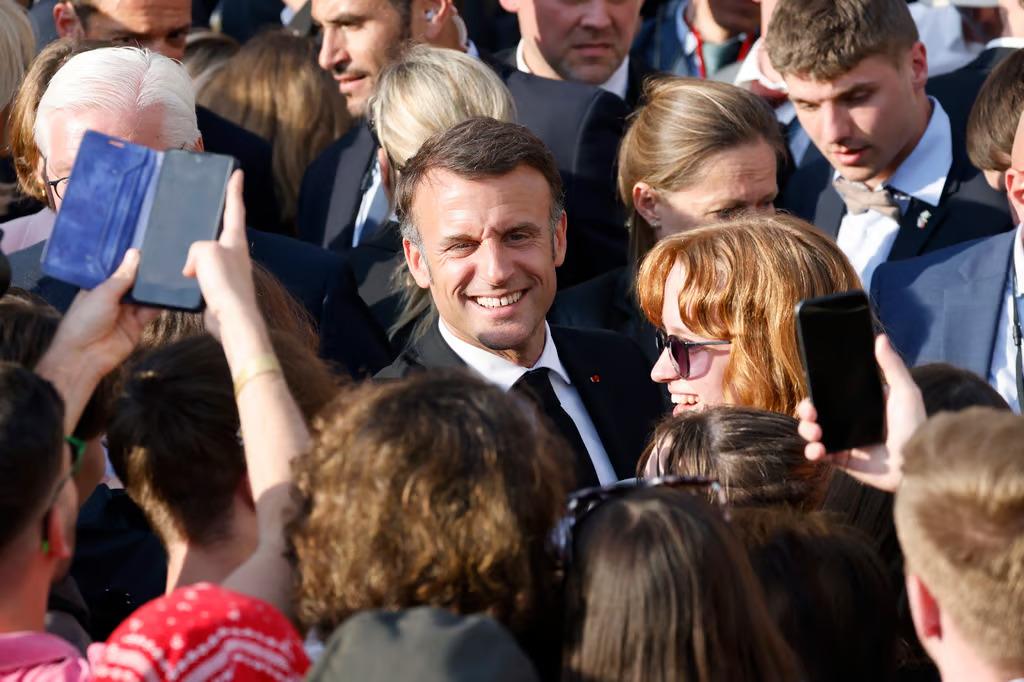Lame ducks Macron and Scholz will struggle to steer EU’s post-election agenda
Politico's fresh article alleges that "the fabled Franco-German engine is sputtering - meaning the next EU top jobs and political priorities are all to play for after next week’s vote". Caliber.Az republishes the article.
Move over, Paris and Berlin. A new cast of European leaders is looking to step up as power brokers on the European stage, and your time in the driving seat may be coming to an end.
With the European election less than two weeks away, France’s Emmanuel Macron is in Berlin on Tuesday as part of a show of Franco-German unity. According to a French official, Macron aims to “set the agenda” and “lay out strategic priorities” for Europe’s future alongside his German counterpart, Olaf Scholz, during the visit.
The problem is that Europe isn’t sure these two - the fabled Franco-German engine of the EU project - should be in charge anymore.
It’s not just that Macron and Scholz have a notoriously icy personal relationship. Or that officials in Paris and Berlin gleefully brief against one another, with the French accusing the Germans of being narrow-minded and hidebound by their coalition - and the Germans saying France is full of nonsense (or something else) on Ukraine. It’s not even that, on key issues like energy, Paris and Berlin are hopelessly at odds.
The new risk for Europe is that Scholz and Macron increasingly look like lame ducks to their fellow EU leaders, politically weakened on the home front and incapable of inspiring confidence in a shared vision for the union.
Both preside over lackluster economies. Both face humiliating defeats at the hands of far-right parties ahead of the June 6-9 European Parliament election. In Macron’s case, polls suggest the election could be a rout, with Marine Le Pen’s National Rally party potentially trouncing his centrist Renaissance group by 16 percentage points. Scholz’ Socialists also look in danger of being beaten into a humiliating third place by the hard right.

The mix of economic weakness, personal frostiness and political weakness is toxic — and critics say it could seriously undermine their authority during top jobs negotiations after the European Parliament elections.
As for “setting the agenda” for Europe? Forget it.
“Macron is going to take a serious beating in this election. The other leaders know this and sense weakness. Does he think that after this, he can dictate terms to the rest of Europe? He will take what he can get,” said a senior conservative political operative in Brussels.
Franco-German engine stalls
One immediate consequence is that the Franco-German engine failure makes the EU top jobs race less predictable. Normally, Scholz and Macron would use their meeting in Berlin to align on their choices for European Commission and Council presidents. With France’s Christine Lagarde in charge of the European Central Bank, the EU’s most powerful job — Commission president — would usually go to a German candidate and automatically be backed by the coalition in Berlin. France would be looking for a rich second prize, possibly an executive vice president role covering competition and industrial policy.
But Macron is holding out on endorsing the obvious candidate for the job, Ursula von der Leyen, despite her repeated attempts to enlist his support.
Instead, a top ally hinted last week that Macron could back Italy’s Mario Draghi, a former head of the European Central Bank who’s more of a political free agent than von der Leyen, for a top EU job.
This could be a vote of confidence for Draghi. Or it could be a case of a weaker Macron looking to strengthen his hand as Paris seeks to avoid humiliation around the Council table.
Now Germany has also thrown a spanner in the works. In comments to POLITICO’s Brussels Decoded newsletter, senior German Social Democrat Markus Töns floated the possibility of backing Draghi over von der Leyen — which on the face of it looks positive, but could also mean further chaos in Germany’s coalition.
Running on empty
Macron’s visit to Germany is being styled as a major diplomatic moment. The first state visit by a French leader in 24 years, it coincides with the 75th anniversary of Germany’s Basic Law, setting out the country’s democratic constitution. Invited by German President Frank-Walter Steinmeier, the French leader is in the country for three days and is seeking to showcase his efforts at learning German.
He’s also looking to make some news. Speaking in Dresden on the second day of his visit, Macron proposed doubling the EU budget to fuel investment into European industry, artificial intelligence and green projects.
But such proposals are increasingly falling on deaf ears. When Macron laid out his grand vision for Europe in his so-called Sorbonne II speech, the reaction from Berlin was crickets — and grumbling behind closed doors.
Even when Paris and Berlin do manage to see eye-to-eye, their efforts to lead and have others follow are falling short. In April, the two sides spent a few days in April aligning their aims for a European Council meeting. The aim was to kickstart talks about a capital markets union, which Draghi has described as a necessary step toward unlocking Europe’s economic potential.
Yet the Franco-German push was promptly seen off by a group of 10 countries not on board with the CMU, and the conclusions lack any kind of specificity on next steps.
China is another major area of dysfunction. Scholz declined a chance to meet with Chinese President Xi Jinping jointly with Macron earlier this month, and Berlin has been strongly opposed to a French push to investigate subsidies for Chinese vehicles, fearing retaliation.
Ditto on enlargement. While Paris and Berlin did work closely on a white paper spelling out the need for internal EU reforms as a complement to bringing in new members, that discussion has since been sidelined — as has the immediate prospect of opening formal accession talks for Ukraine and Moldova, deemed too sensitive to handle during campaign season. Diplomats are now tentatively penciling in the opening of formal accession talks for June 25, after the election.
Some politicians in Germany are starting to fret out loud about the lack of entente between Scholz and Macron. “Macron deserves an answer to his initiatives; to his regularly, if not permanently, outstretched hand,” Hendrik Wüst, Christian Democratic Union premier of North Rhine-Westphalia, told the Berlin Playbook podcast. “German politicians are reacting too hesitantly.”
Meloni, Tusk step up
While Paris and Berlin face a loss of influence, other EU leaders spy an opportunity to increase theirs. Amid the war in Ukraine and the weakening of the Franco-German axis, people like Poland’s Prime Minister Donald Tusk, Estonia’s Kaja Kallas and Italy’s Giorgia Meloni have emerged as major power players on the EU stage.

“Italy is no longer following France and Germany, but leading the way,” she told Rai Radio 1 on Monday. “If the Italians help me, we can change Europe.”
Indeed Meloni is now in the position of European kingmaker after the EU-wide elections, as von der Leyen urgently needs her support both in Council and in Parliament if she wants to serve another five years running the Commission from the Berlaymont.
Meloni’s also being courted by French far-right leader Marine Le Pen, who’s invited her to join an expanded right-wing grouping in the European Parliament — something Macron’s centrist allies are powerless to prevent.
As for Poland, senior EU officials underscore that Tusk has become an unavoidable force to be reckoned with. This comes across via the revival of the so-called Weimar Triangle composed of Paris, Berlin and Warsaw, but it could also become more contentious in the event that Paris and Warsaw end up competing for key roles in the EU institutions.
Yet even die-hard haters admit there is a price to pay for Franco-German dysfunction. As one EU diplomat from a medium-sized country quipped on condition of anonymity: “We don’t like it when the Franco-German couple is too strong but we also don’t like it when it’s too weak because nothing gets done.”








